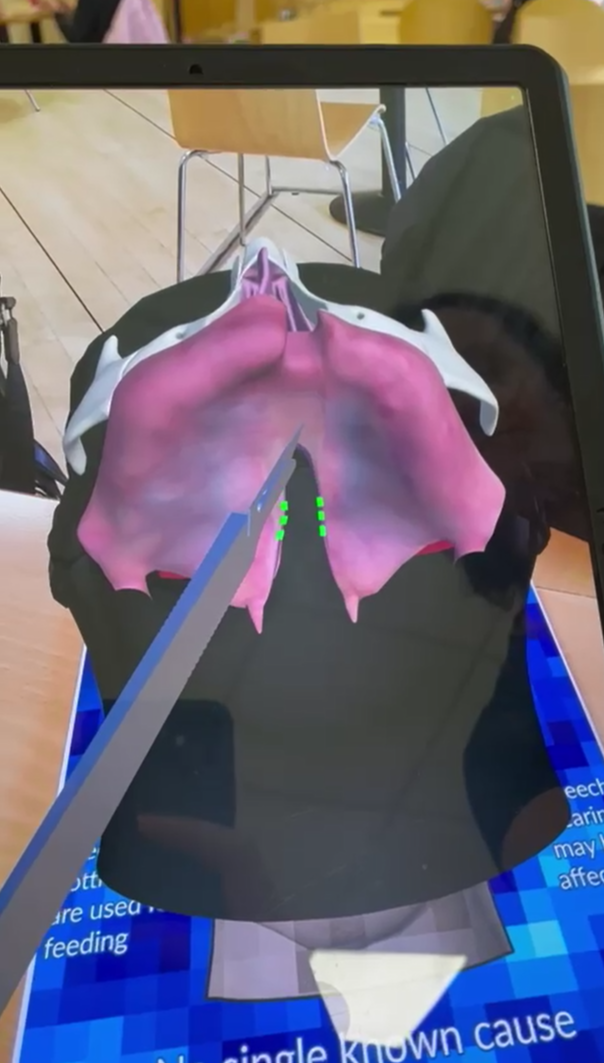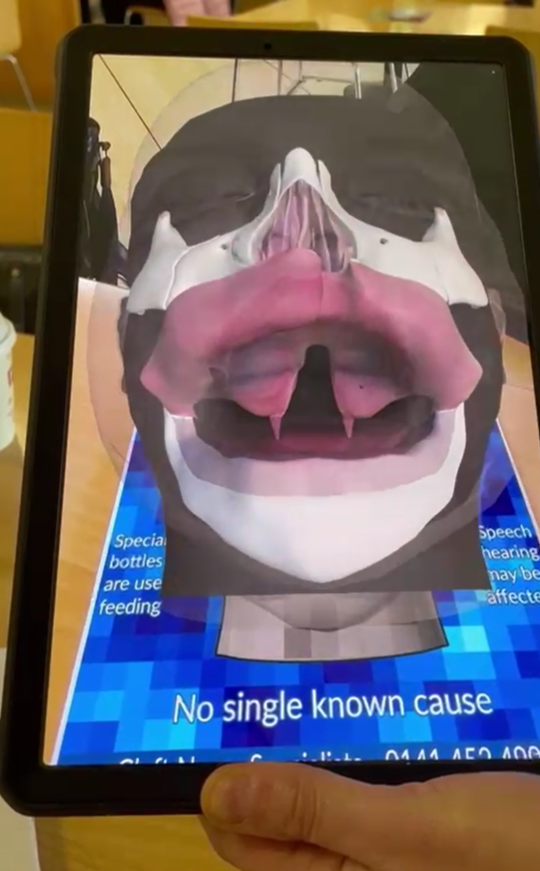Pioneering augmented reality tech for cleft palate operations ready for patient use
World-first technology which uses augmented reality to explain cleft lip and/or palate surgery to parents of young babies is to be rolled out for widespread patient use.
The Cleft Lip Education Augmented Reality (CLEAR) project, led by the West of Scotland Innovation Hub, provides families with a leaflet to be scanned via a smartphone or tablet app to see a visual demonstration of the operation their child will go through.
Augmented reality results in the leaflet coming to life with an interactive 3D model appearing in the room to walk parents through the procedure.
The technology will now be available for use by patients and their families following a successful trial in NHS Greater Glasgow and Clyde at the Royal Hospital for Children.
During the three-year trial period, it has been used to provide information and reassurance to 42 families whose babies were undergoing surgery for a cleft lip and/or palate.
It will now be available to all parents whose children are due to have this type of operation in the health board area, and it is hoped it will be rolled out nationally in the future.
Around 90 babies are born with a cleft lip and/or palate in Scotland each year, and may require one or more surgical procedures to repair a gap or split in their upper lip and/or the roof of their mouth.
The CLEAR interactive interface has been developed to help families better understand what will happen during their child’s procedures and is the first of its kind anywhere in the world.
The visual element of the leaflet also supports parents for whom English is not their first language, and those with dyslexia who may have previously struggled with a traditional text-only paper leaflet.

One dad, who took part in the trial ahead of his daughter having surgery, said: “It was a lot more informative and easier to understand.
“I think it would help younger parents who are going through the same situation as myself with my daughter.
“It’s easier to take in than just reading sentence after sentence on a page, and it actually shortens your research time not having to sit and look on Google or wherever else you search.
“I think it’s a good idea and whoever thought of it is a genius.”
In separate feedback, another parent said: “I prefer augmented reality because I struggle with my reading with Meares-Irlen dyslexia, which is issues with your eyes.
“It’s more interactive and so much easier to get information from it.”
Through the WoSIH, which is hosted by NHSGGC, the patient app was co-developed by Canniesburn Plastic Surgery Unit, The Glasgow School of Art, paediatric health innovation centre Hi and The National Cleft Service for Scotland, with funding from the Glasgow Children’s Hospital Charity.
Professor Steven Lo, Consultant Plastic Surgeon and WoSIH Innovation Fellow, previously told how the CLEAR leaflet takes inspiration from newspapers in the Harry Potter films that “come to life to tell a story”.
And speaking ahead of the roll out to patients, Prof Lo said: “This technology, which is the first of its kind in the world, was developed with patient input and has had excellent feedback from parents who have used it during the initial trial in NHSGGC.
“When a baby has to undergo a surgical procedure, it can be a very daunting and anxious time for parents.
“The scannable leaflet gives families the opportunity to learn more about what is going to happen, and provides a life-sized 3D visual demonstration, which helps to answer their questions and provide reassurance.
"To ensure the augmented reality leaflet worked effectively for parents before rolling it out, a Randomised Controlled Trial was undertaken.
“This showed very strong benefits in terms of patient understanding and satisfaction, in comparison to a traditional patient leaflet.
“We are delighted that this technology is now ready for patient use.”

Professor Paul Chapman, Director of Emerging Technology at The Glasgow School of Art, said: “The Glasgow School of Art are pleased to have played an instrumental part in co-developing the Cleft Lip Augmented Reality leaflet app through our expertise in medical visualisation, 3D modelling and computer programming.
“This is a world first that will positively impact patients’ lives in Scotland and beyond.”
Kirsten Watson, CEO, Glasgow Children’s Hospital Charity, said: “Our generous donors, whose funding made this project possible, share a heartfelt commitment to innovation in children’s healthcare. We are delighted that more families will benefit from this pioneering work, and will continue to raise vital funds to develop the very latest technology here in Glasgow.”